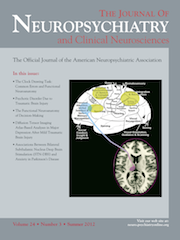Acute Pisa Syndrome After Administration of a Single Dose of Donepezil
To the Editor: Tardive dystonia syndromes are well known complications of prolonged treatment with antipsychotic medications, especially the classic ones. Pisa syndrome, a sustained dystonia of the trunk and head to one side, is considered as an atypical form of tardive dystonia and sometimes can be acute.1 Several cases have also been reported in patients taking acetylcholinesterase inhibitors (ACEIs) for at least 1 month.2 We report a patient suffering from Alzheimer’s disease (AD) who presented with acute Pisa syndrome after administration of a single donepezil dose.
Case Report
A 74-year-old, right-handed woman was referred to our clinic for evaluation of memory complaints. Her past medical history was unremarkable and negative for dementia. On examination, she had brisk tendon reflexes, Babinski sign bilaterally, and primitive reflexes. Her MMSE score was 18. Neuropsychological evaluation revealed poor episodic, visual and verbal memory, as well as learning deficits compatible with AD. A brain MRI showed generalized atrophy. She was discharged with the diagnosis of AD, and donepezil was prescribed. Two days after her dismissal, her daughter called us, saying fearfully that her mother’s head and body were turned in one side. The patient had suffered acute Pisa syndrome a few hours after donepezil treatment was initiation. The drug was discontinued. On follow-up, 8 days later, her head position had turned back to normal.
Discussion
Pisa syndrome had classically been understood as an exclusive complication of antipsychotic treatment. During the last decade, there have been a few reports of Pisa syndrome in patients taking ACEIs, either alone or in combination with atypical antipsychotics.3 There has also been a report of three Pisa syndrome cases in a large cohort of AD patients treated with ACEIs.4 In all of these cases, discontinuation of the drug resulted in resolution of the dystonic reaction. Interestingly, the delay from the initiation of ACEIs to the appearance of Pisa syndrome varied greatly, but was at least 1 month-long.2
Our patient developed acute Pisa syndrome after the first dose of donepezil, while she had not been previously prescribed with any other ACEI, antipsychotic, antiemetic, or antidepressant medication. Withdrawal of donepezil resulted in resolution of dystonia in several days’ time.
Dystonic reactions after cholinergic medications are thought to represent a disbalance between cholinergic and dopaminergic receptor activity in the basal ganglia, yet the exact pathophysiological mechanism remains unknown.5 Our present case highlights that acute laterocollis and Pisa syndrome could be induced by ACEI treatment in dementia patients, who are susceptible to polypharmacy and drug interactions, even in the first days of treatment and immediate discontinuation of the drug is needed.
1 : Drug-induced Pisa syndrome (pleurothotonus): epidemiology and management. CNS Drugs 2002; 16:165–174Crossref, Medline, Google Scholar
2 : [Relation between Pisa syndrome and choline esterase inhibitors in a cohort of Alzheimer’s disease patients]. Presse Med 2009; 38:150–153Crossref, Medline, Google Scholar
3 : Relation between cholinesterase inhibitor and Pisa syndrome. Lancet 2000; 355:2222Crossref, Medline, Google Scholar
4 : Pisa syndrome in a cohort of Alzheimer’s disease patients. Acta Neurol Scand 2005; 111:199–201Crossref, Medline, Google Scholar
5 : Cholinergic-dopaminergic imbalance in Pisa syndrome. Clin Neuropharmacol 2003; 26:119–121Crossref, Medline, Google Scholar



